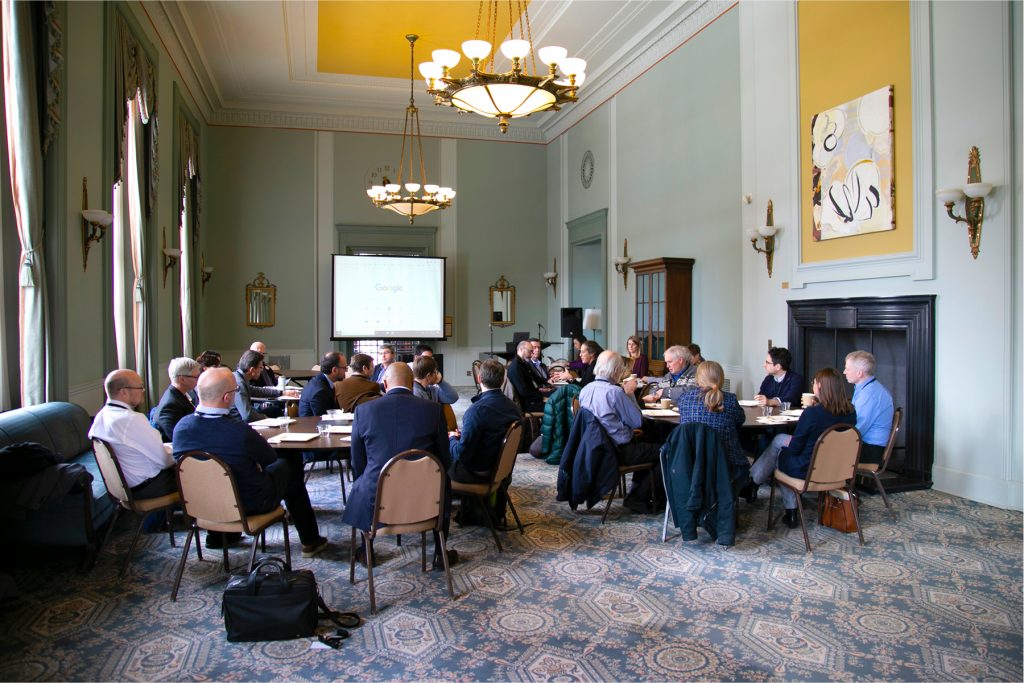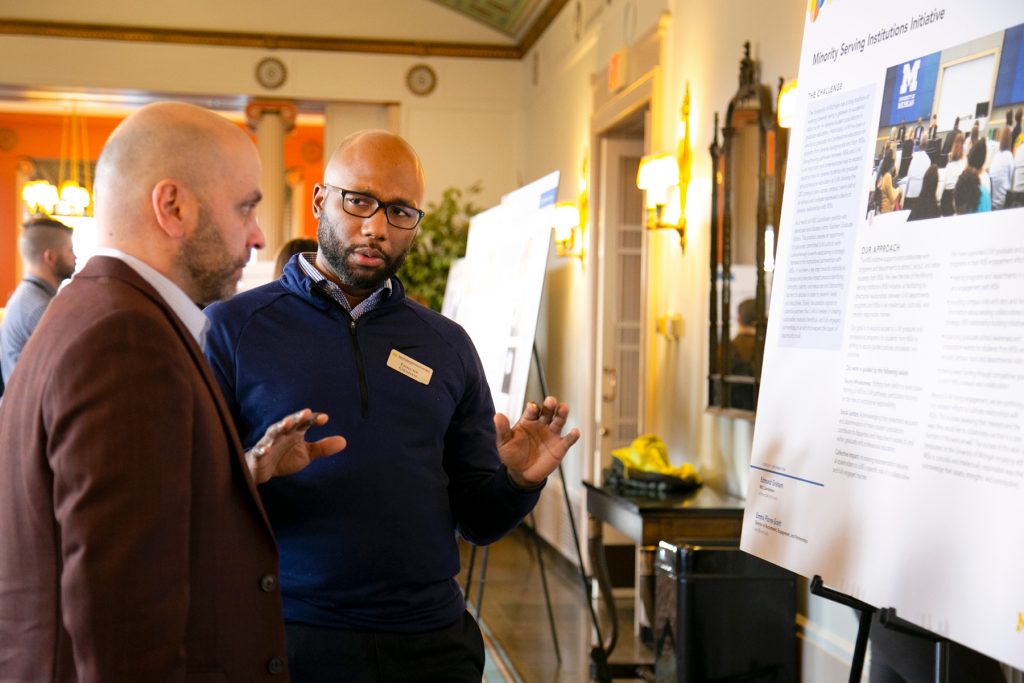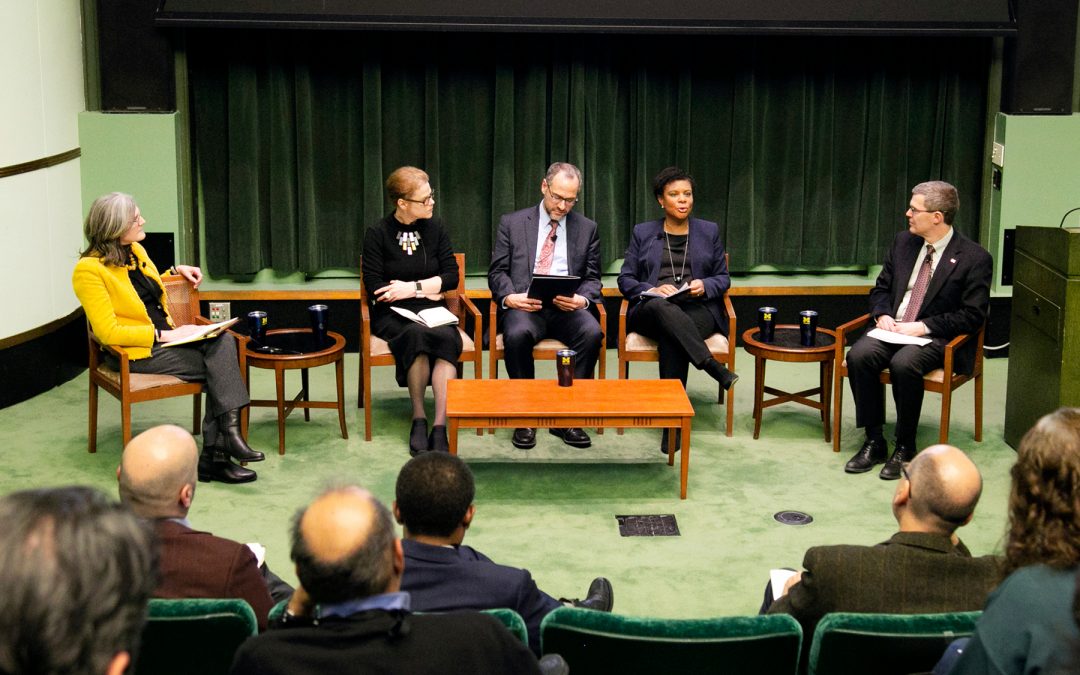On February 7, Rackham Graduate School hosted Advancing New Directions in Graduate Education, a national symposium that brought together academic leaders from across the country and U-M graduate faculty, staff, and students.
The symposium was convened as part of Rackham’s Strategic Vision for Graduate Education, which was launched last fall and was prompted by current pressures facing graduate students and programs. These pressures include better preparing students for expanded career pathways outside of academia, rising concerns about graduate student mental health, and growing skepticism about the costs and benefits of graduate training, to name a few. The symposium aimed to examine how universities have traditionally conducted graduate education and consider opportunities for rethinking that approach for the century ahead.
“So many of the issues that our society will face in the next half-century are grounded in the need for inquiry, evidence, research, scholarship, and engagement across difference and with wider public communities,” said Rackham Dean Mike Solomon. “The graduate students who we train have skills, experience, and knowledge that are essential to addressing these issues. In fact, I would argue that it’s simply a missed opportunity if those trained with advanced skills in research and scholarship use them only in the academy.”
Following opening remarks from Solomon, the symposium featured two panel discussions, each followed by a conversation with an audience of more than 150 Michigan faculty members, staff members, and students.

Faculty members in the physical sciences and engineering share ideas at one of five breakout sessions.
The first panel, moderated by Solomon, addressed broadly the challenges and opportunities for graduate education in the 21st century. Panelists included:
- Joy Connolly, the President of the American Council of Learned Societies and Distinguished Professor of Classics at The Graduate Center of the City University of New York
- Adam Falk, the President of the Alfred P. Sloan Foundation
- Dianne Harris, a Senior Program Officer at the Andrew W. Mellon Foundation
- Alondra Nelson, the President of the Social Science Research Council
“My deep belief is that this is a moment when faculty everywhere at doctorate granting institutions must roll up their sleeves and get ready to change,” Harris said. “But to do the hard work, the real and meaningful transformation has to happen with institutional support from the very highest levels down. Everybody has to not just talk the talk—everybody has to start walking the walk.”
Earl Lewis, the founding director of the Center for Social Solutions at U-M and a former Rackham dean and vice provost, moderated the second panel, which discussed the challenges faced by graduate schools and programs as they adapt to change while maintaining academic excellence. Panelists included:
- Edward Balleisen, the Vice Provost for Interdisciplinary Studies and Professor of History and Public Policy at Duke University
- Robin L. Garrell, the Vice Provost and Dean of Graduate Education and Professor of Chemistry and Biochemistry, and of Bioengineering at the University of California, Los Angeles
- Charles Isbell, Jr., the John P. Imlay, Jr. Dean of the College of Computing and Professor of Computer Science at the Georgia Institute of Technology
- Elizabeth Watkins, the Dean of the Graduate Division, Vice Chancellor for Student Affairs, and Professor of Anthropology, History, and Social Medicine at the University of California, San Francisco
- Enrique De La Cruz, the Head of Branford College and Professor of Molecular Biophysics and Biochemistry and in the Combined Program in Biological and Biomedical Sciences at Yale University
“Academics are really good at studying others, but we don’t study ourselves in the same ways,” Lewis said. “Our ability to actually interrogate ourselves will be critical. Failure to do that means we’ll end up asking again and again the wrong questions and coming up with perhaps incomplete answers if not the wrong answers.”
The panel events were followed by four faculty breakout sessions—discussing biological and health sciences, physical sciences and engineering, social sciences, and humanities and the arts—as well as a staff and student breakout discussion. Report-outs and a reception and poster session concluded the day.
Recommendations that emerged from the breakout sessions included a need to begin focusing on professional development at the outset of a student’s graduate education, the importance of internships, the need for more holistic mentoring, and clarifying faculty roles in fostering student wellness.

Invited panelist Enrique De La Cruz (left) of Yale University talks with Rackham Minority Serving Institutions Coordinator Edmund Graham at the reception and poster session.
Rackham’s strategic vision aims to emphasize a holistic view of graduate training that prepares students for an expanded range of career opportunities, strengthens graduate student diversity, and increases opportunities for both doctoral and master’s students to pursue cross-disciplinary projects, research, and experiences that can be applied toward solving complex, real-world challenges.
Read the Full Text of Dean Solomon’s Remarks
Learn More About Rackham’s Strategic Vision for Graduate Eduaction

